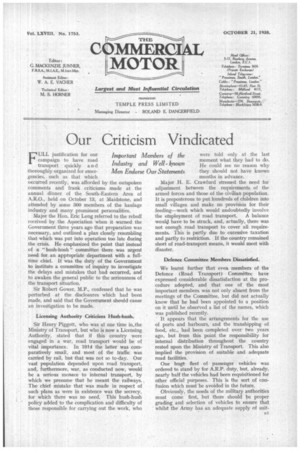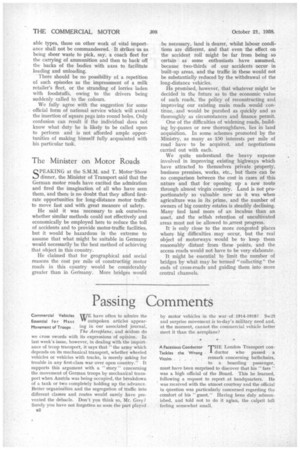Our Criticism Vindicated
Page 35

Page 36

If you've noticed an error in this article please click here to report it so we can fix it.
FULL justification for our campaign to have road transport quickly an d thoroughly organized for emergencies, such as that which occurred recently, was afforded by the outspoken comments and frank criticisms made at the annual dinner of the South-Eastern Area of A.R.O., held on October 13, at Maidstone, and attended by some 300 members of the haulage industry and many prominent personalities.
Major the Hon. Eric Long referred to the rebuff received by the Association when it warned the Government three years ago that preparation was necessary, and outlined a plan closely resembling that which was put into operation too late during the crisis. He emphasized the point that instead of a " hush-bush " committee there was urgent need for an appropriate department with a fulltime chief. It was the duty of the Government to institute a committee of inquiry to investigate the delays and mistakes that had occurred, and to awaken the general public to the seriousness of the transport situation.
Sir Robert Gower, M.P., confessed that he was perturbed at the disclosures which had been made, and said that the Government should cause an investigation to be made.
Licensing Authority Criticizes Hush-hush.
Sir Henry Piggott, who was at one time in.the Ministry of Transport, but who is now a Licensing Authority, stated that if this country were engaged in a war, road transport would be of vital importance. In 1914 the latter was comparatively small, and most . of the traffic was carried by rail, but that was not so to-day. Our vast population depended upon road transport, and, furthermore, war, as conducted now, would be a serious menace to internal transport, by which we presume that he meant the railways. The chief mistake that was made in respect of such plans as were in existence was the secrecy, for which there was no need. This hush-hush policy added to the complication and difficulty of those responsible for carrying out the work, who were told only at the last moment what they had to do. He could see no reason why they should not have known months in advance.
Major H. E. Crawfurd stressed the need for adjustment between the requirements of the armed forces and those of the civilian population. It is preposterous to put hundreds of children into small villages and make no provision for their feeding—work which would undoubtedly involve the employment of road transport. A balance would have to be struck, and, actually, there was not enough road transport to cover all requirements. This is partly due to excessive taxation and partly to restriction. If the country remained short of road-transport means, it would meet with disaster.
Defence Committee Members Dissatisfied.
We learnt further that even 'members of the Defence (Road Transport) Committee have expressed considerable dissatisfaction at the procedure adopted, and that one of the most important members was not only absent from the meetings of the Committee, but did not actually know that he had been appointed to a position on it until he observed a list of the names, which was published recently.
It appears that the arrangements for the use of ports and harbours, and the transhipping of food, etc., had been completed over two years ago, but from this point the responsibility for internal distribution throughout the country rested upon the Ministry of Transport. This also implied the provision of suitable and adequate road facilities.
One huge fleet of passenger vehicles was ordered to stand by for A.R.P. duty, but, already, nearly half the vehicles had been requisitioned for other official purposes. This is the sort of confusion which must be avoided in the future.
Obviously, the needs of the military authorities must come first, but there should be proper grading and selection of vehicles to ensure that whilst the Army has an adequate supply of suit able types, those on other work of vital importance shall not be commandeered. It strikes us as being sheer waste to pick, say, a coach fleet for the carrying of ammunition and then to hack off the backs of the bodies with axes to facilitate loading and unloading.
There should be no possibility of a repetition of such episodes as the impressment of a milk retailer's fleet, or the stranding of lorries laden with foodstuffs, owing to the drivers being suddenly called to the colours.
We fully agree with the suggestion for some official form of national service which will avoid the insertion of square pegs into round holes. Only confusion can result if the individual does not know what duty he is likely to be called upon to perform and is not afforded ample opportunities of making himself fully acquainted with his particular task.
The Minister on Motor Roads SPEAKING at the S.M.M. and T. Motor Show dinner, the Minister of Transport said that the German motor roads have excited the admiration and fired the imagination of all who have seen them, and there is no doubt that they afford firstrate opportunities for long-distance motor traffic to move fast and with great measure of safety.
He said it was necessary to ask ourselves whether similar methods could not effectively and economically be employed here to reduce the toll of accidents and to provide motor-traffic facilities, but it would be hazardous in the extreme to assume that what might be suitable in Germany would necessarily be the best method of achieving that object in this country.
He claimed that for geographical and social reasons the cost per mile of constructing motor roads in this country would be considerably greater than in Geimany. More bridges would be necessary, land is dearer, whilst labour conditions are different, and that even the effect on the accident roll might be far from being so certain as some enthusiasts have assumed, because two-thirds of our accidents occur in built-up areas, and the traffic in these would not be substantially reduced by the withdrawal of the long-distance vehicles.
He promised, however, that whatever might be decided in the future as to the economic value of such roads, the policy of reconstructing and improving our existing main roads would continue,.and would be pursted as quickly and as thoroughly as circumstances and finance permit.
One of the difficulties of widening roads, building by-passes or new thoroughfares, lies in land acquisition. In some schemes promoted by the, Ministry, as many as 150 interests per mile of road have to be acquired, and negotiations carried out with each.
We quite understand the heavy expense involved in improving existing highways which have attracted to themselves private property, business premises, works, etc., but there can be no comparison between the cost in cases of this nature and that for opening up a new route through almost virgin country. Land is not proportionately so valuable now as it was when agriculture was in its prime, and the number of owners of big country estates is steadily declining. Many find land more of an incubus than an asset, and the selfish retention of uncultivated areas must not be allowed to arrest progress.
It is only close to the more congested places where big difficulties may occur, but the real object of motorways would be to keep them reasonably distant from these points, and the access roads would not have to be very elaborate.
It might be essential to limit the number of bridges by what may be termed "collecting" the ends of cross-roads and guiding them into more central channels.




























































































